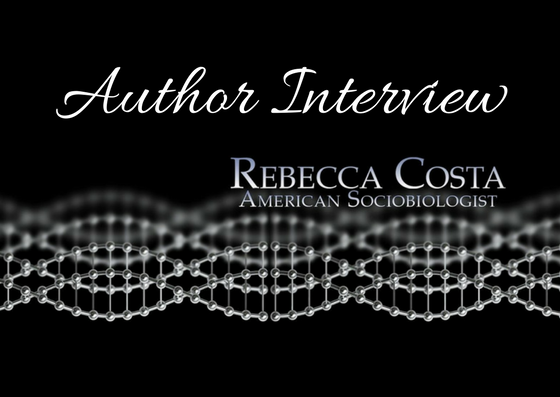An Interview with Rebecca D. Costa, American Sociobiologist + Non-fiction Giveaway

Rebecca D. Costa is an American sociobiologist and futurist. She is a world renowned expert on "fast adaptation" in complex environments, and a recipient of the prestigious Edward O. Wilson Biodiversity Technology Award. Her work has been featured in the New York Times, Washington Post, USA Today, The Guardian, and other leading publications.
Read our interview with Rebecca to learn more about her writing habits and inspiration!
NON-FICTION GIVEAWAY!
WIN On the Verge by Rebecca D. Costa
According to Costa, advances in Big Data, predictive analytics, genomics, artificial intelligence, and other breakthroughs have made it possible to pinpoint future results with mind-blowing accuracy - cracking the door to what Costa calls predaptation: the ability to adapt before the fact. Never before has the information needed to avert danger, get the jump ahead of others, or prepare for the inevitable been so clearly within grasp.
Through fascinating real-life examples, Costa reveals how technology has brought nations, businesses, and individuals to the edge of clairvoyance. Yet, our ability to act on foreknowledge often falls short - causing leaders to squander the advantage of preemption. To counteract this failure, Costa illuminates 12 principles of adaptation, and predaptation, used to succeed in fast-moving environments.
Tell us a few words about yourself – whatever you want to share about your personal and professional life, but also why you decided to become a writer.
After spending much of my childhood abroad and enjoying a successful career in Silicon Valley, I returned to my love of Charles Darwin and study of human evolution. My work in technology caused me to observe a growing gap between the speed at which change was occurring and the slow pace of physiological adaptation. This compelled me to write my first book, The Watchman’s Rattle, which became a success in 21 countries, and which thought- leaders E.O. Wilson, Richard Branson, Dr. James Watson stepped forward to lend their support to. Six years later I published On the Verge.
How did you start writing?
Upon selling my company in Silicon Valley I retired to the small hamlet of Carmel, California, where I began combing through notebooks I maintained throughout my career, working with companies such as Apple Computer, Amdahl, Oracle, General Electric, etc. The notebooks inspired me to write my first book.
What are your writing habits? How often do you write, and how long at one time?
My writing comes in fits and starts. Similar to a radio station, clarity comes and goes. I am often awoken at 3 AM to write - and the duration of any writing period can last anywhere from a few hours to a few days. Then, just as suddenly, the signal is gone. For this reason, it is impossible to keep any semblance of a normal life when writing. There is a reason gifted writers are often alcoholics, drug addicts and have disagreeable personalities – writing is madness.
What advice would you give to someone who wants to become a writer – to someone like you before you became a published author?
Writing is not a choice. It’s a calling. If you have the calling, then regardless of whether one person, or millions, read your work, the process is gratifying. You won’t make any money writing a book, so any illusions about getting rich should be quashed early. Find a good agent and editor and always listen to your editor.
Who are your favorite authors?
E.O. Wilson, Yuval Noah Harari, Jared Diamond, Carson McCullers.
What would you like to say to our readers? What do they need to know about your
books?
The opposite of politics is science. The more facts we have at our disposal the better able we are to guard against manipulation. But facts don’t have to be boring. Good storytelling is good storytelling regardless of the subject. Our favorite teachers in school made history come alive, science fun, and turned mathematics into a game. Good nonfiction writing should be held to that standard – it should engage us to the point where the time flies by and we didn’t even notice we were learning something new. I hope my easy style is what separates me from other writers in my genre.
Love science books?
Join The Flat Book Society Book Club on BookLikes.
We're here to read and discuss what would generally be called 'popular' science titles; one book every other month. Welcome!





